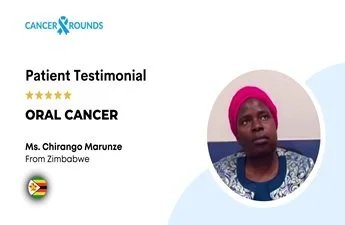Throat Cancer Treatment in India
Throat cancer is a type of cancer that occurs when malignant tumors develop in the pharynx, larynx, or tonsils. These growths can impact essential functions such as speech, swallowing, and breathing. Early detection of symptoms and prompt treatment are critical, as they greatly improve survival rates and enhance quality of life.
India has become a leading global destination for throat cancer treatment, thanks to its team of highly skilled oncologists, state-of-the-art medical facilities, and cost-effective treatment options. The country provides advanced therapies, including robotic surgery and targeted treatments, along with comprehensive care across all stages—from diagnosis and treatment to rehabilitation. This combination of expertise and affordability ensures patients receive complete support according to their needs.
Understanding Throat Cancer
Throat cancer is characterized by the uncontrolled growth of abnormal cells in the throat, including the voice box and tonsillar region. It typically begins in the squamous cells lining the throat and can quickly spread to nearby structures without early intervention.
Common Types of Throat Cancer
- Laryngeal Cancer: Originates in the larynx (voice box) and may lead to hoarseness or voice loss.
- Pharyngeal Cancer: Affects the pharynx, subdivided into:
- Nasopharyngeal (upper throat, behind the nose)
- Oropharyngeal (mid-throat, includes tonsils and tongue base)
- Hypopharyngeal (lower throat, near the esophagus)
- HPV-Related Oropharyngeal Cancer: Linked to the human papillomavirus (HPV), this type often occurs in the tonsils or base of the tongue.
Symptoms and Early Signs
Recognizing early warning signs is crucial. Persistent symptoms should not be ignored, especially among high-risk individuals such as smokers or those with prolonged alcohol use.
Symptoms to Watch Out For
- Vocal Changes: Persistent hoarseness or changes in voice, such as a quieter or huskier tone, are common symptoms. These changes can also include slurred speech or difficulty pronouncing certain words.
- Difficulty Swallowing: Pain or a burning sensation while swallowing, and feeling as if food is stuck in the throat, are indicative of throat cancer.
- Persistent Sore Throat or Cough: A sore throat that doesn’t heal or a chronic cough, which may produce blood, are warning signs.
- Lump or Swelling in the Neck: Swollen lymph nodes can cause noticeable lumps in the neck, often associated with advanced stages of throat cancer.
- Unexplained Weight Loss: Sudden weight loss without a clear reason can be a symptom of throat cancer, often due to difficulty swallowing.
- Unilateral Ear Pain: Pain in one ear can be a symptom, though it is less common.
Early Signs and Importance of Recognition
- Persistent Symptoms: It’s crucial not to ignore persistent symptoms, especially if you are a smoker or have a history of prolonged alcohol use.
- High-Risk Groups: Individuals with risk factors such as smoking, alcohol consumption, or HPV infection should be vigilant about these symptoms.
Risk Factors for Throat Cancer
The following group of people are more prone to throat cancer.
- Tobacco Use: Smoking is the most significant risk factor for throat cancer, including laryngeal cancer.
- Alcohol Consumption: Excessive alcohol use increases the risk, particularly when combined with smoking.
- HPV Infection: Certain strains of the human papillomavirus (HPV), like HPV 16 and HPV 18, are linked to oropharyngeal cancer.
- Age and Gender: Throat cancer is more common in individuals over 50 and in men.
- Family History: A family history of cancer can increase the risk due to genetic predispositions.
- Diet and Lifestyle: A poor diet and lack of regular check-ups can contribute to increased risk
Doctors For Throat Cancer
Need More Recommendations ?
Diagnostic Procedures
Early and precise diagnosis forms the backbone of effective throat cancer treatment. Hospitals in India are equipped with the latest diagnostic technologies for accurate assessment.
Key Diagnostic Tests
- Physical Examination: Palpation of the neck and throat for abnormal growth.
- Endoscopy: A flexible tube with a camera helps visualize the inner throat structures.
- Imaging Tests:
- CT Scan and MRI: Help determine tumor size and location.
- PET Scan: Detects cancer spread to other parts of the body.
- Laryngoscopy: Examines the larynx and vocal cords for abnormalities.
- Nasopharyngoscopy: Enables inspection of the upper throat via the nasal passage.
- Biopsy: Tissue sample collection to confirm malignancy.
- Fine Needle Aspiration (FNA): For lymph node assessment.
- Ultrasound of the Neck: Assesses lymph nodes and surrounding structures.
- Barium Swallow Test: Identifies issues in the esophagus and throat function.
- Molecular and Genetic Testing: Detects markers that may guide targeted therapy.
- HPV Testing: Especially relevant for oropharyngeal cancers.
Each of these tests supports comprehensive cancer staging and helps doctors determine the best course of treatment.
Throat Cancer Treatment in India
India offers advanced, multi-modality treatment options for throat cancer, according to the cancer type, location, and stage, as well as the patient’s general health condition. Treatment typically involves a combination of surgery, radiation, and systemic therapies.
Surgical Procedures
- Endoscopic Resection: This minimally invasive technique uses an endoscope to remove small tumors, preserving surrounding tissues and functions. It is particularly beneficial for early-stage cancers, offering quicker recovery times and minimal scarring.
- Laryngectomy:
- Partial Laryngectomy: Only the affected part of the larynx is removed, preserving voice quality as much as possible. This is suitable for smaller tumors.
- Total Laryngectomy: The entire voice box is removed, typically in advanced cases where cancer has spread extensively. This procedure may require a permanent tracheostomy.
- Neck Dissection: This involves the removal of cancerous lymph nodes from the neck to prevent the spread of cancer. It can be performed as a standalone procedure or in conjunction with other surgeries.
Radiation Therapy
Radiation therapy is a critical component of throat cancer treatment, often used in conjunction with surgery or chemotherapy. Advanced techniques include:
- Intensity-Modulated Radiation Therapy (IMRT): Allows precise targeting of tumors while minimizing exposure to surrounding healthy tissues, reducing side effects like xerostomia (dry mouth) and dysphagia (difficulty swallowing).
- Image-Guided Radiation Therapy (IGRT): Enhances the accuracy of radiation delivery by using imaging technologies to guide the treatment process.
Systemic Therapies
- Chemotherapy:
- Chemotherapy is used to kill cancer cells and is often administered alongside radiation therapy (chemoradiation) for advanced or metastatic cancers.
- Common regimens include cisplatin-based treatments.
- Targeted Therapy:
- These therapies target specific molecular pathways involved in cancer cell growth and survival, offering potentially fewer side effects compared to traditional chemotherapy.
- Cetuximab is a targeted therapy used in the treatment of head and neck cancers, including throat cancer, by blocking specific pathways involved in cancer cell growth and survival. It specifically targets the epidermal growth factor receptor (EGFR), which is overexpressed in many head and neck cancers, including throat cancer.
- Immunotherapy:
- This approach leverages the body’s immune system to fight cancer and is particularly effective for certain types of head and neck cancers, especially those resistant to other treatments.
Current Protocols and Guidelines
The Oral Cancer Task Force (OCTF) has developed India-specific guidelines for head and neck cancer management, emphasizing early detection, multidisciplinary treatment approaches, and the integration of palliative care.
These guidelines highlight the importance of standardized diagnostic protocols, advanced surgical techniques like robotic surgery, and personalized treatment plans for individual patient needs
Advanced Cancer Treatment For Throat Cancer in India
India’s top cancer hospitals are equipped with state-of-the-art tools and techniques that improve precision and reduce complications:
Here are the advanced treatment options for throat cancer:
- Immunotherapy:
- Ultra-Low Dose Nivolumab: Studies in India have shown promising results with ultra-low doses of nivolumab, offering a more affordable and effective option for advanced head and neck cancers.
- Pembrolizumab and Other Checkpoint Inhibitors: These drugs enhance the body’s immune response against cancer cells, providing an alternative to traditional chemotherapy.
- Precision Medicine:
- Genomic testing helps identify genetic mutations, allowing for personalized treatment strategies.
- Ensures therapies are more effective with fewer side effects.
- Concurrent Chemoradiotherapy (CTRT):
- Recommended for locally advanced laryngeal carcinoma, combining chemotherapy with radiation therapy to enhance treatment efficacy while preserving organ function.
- Advanced Radiation Therapies:
- Proton Beam Therapy (PBT): Available in select facilities, PBT offers precise targeting with minimal damage to healthy tissues.
- HPV-Directed Treatment:
- For HPV-positive throat cancers, treatment de-escalation strategies are being explored to reduce toxicity while maintaining outcomes.
- Includes adjusting chemotherapy or radiation doses based on HPV status.
Key Considerations
- Multidisciplinary Approach: Comprehensive care involving clinicians, dietitians, physiotherapists, and speech therapists is crucial for optimal outcomes.
- Clinical Trials and Research: Participation in clinical trials can provide access to innovative treatments not yet widely available.
- Genomic Testing and Personalized Medicine: Essential for identifying genetic mutations and tailoring treatments accordingly.
These advanced treatment options highlight the evolving landscape of throat cancer management in India, focusing on precision, effectiveness, and patient quality of life.
Rehabilitation and Post-Treatment Care
Recovery is a long-term process that continues well after the medical treatment concludes. Indian hospitals offer complete rehabilitation services to support patient recovery physically, emotionally, and socially.
Key Aspects of Recovery
- Speech and Voice Therapy: Especially critical for patients undergoing partial or total laryngectomy. Therapy helps them regain communication skills.
- Nutritional Counseling: Soft, nutritious, and easy-to-swallow foods are essential. Dietitians tailor plans to meet calorie and protein needs.
- Swallowing Therapy: Helps restore safe and effective swallowing ability.
- Psychological Support: Counseling and support groups play a major role in managing emotional well-being and preventing post-treatment depression.
- Follow-Up Care: Regular follow-ups are vital to detect recurrence and manage side effects.
Most patients require several months of therapy and check-ups, especially if their voice or eating functions are impacted.
5 easy Steps to Get Treated in India

Share Case Details

Get Expert Opinion and Hospital Quotes

Get Visa Invitation & Hotel Recommendations

Get Received At Airport and Start Your Treatment

Travel Back and Get Followups Through Us
Preventive Measures and Risk Reduction
While not all causes of throat cancer can be prevented, lifestyle changes can significantly reduce the risk.
- Avoid Tobacco: Both smoking and chewing tobacco increase the risk.
- Limit Alcohol Intake: Alcohol is a known carcinogen, especially when combined with tobacco.
- HPV Vaccination: A safe and effective vaccine that can prevent HPV-related oropharyngeal cancer.
- Safe Sexual Practices: Reduce exposure to HPV.
- Regular Screenings: Particularly for high-risk groups, early detection improves outcomes.
- Healthy Diet: A balanced diet rich in fruits and vegetables can support immunity and overall health.
Why Choose India for Throat Cancer Treatment?
India offers a unique combination of medical excellence, affordability, and accessibility. Patients from around the world choose India for several reasons:
- Internationally accredited cancer centers.
- Board-certified oncologists with global experience.
- Short waiting periods for diagnosis and surgery.
- Full spectrum of treatment options, including advanced modalities.
- Dedicated patient coordinators for international patients.
- Lower cost without compromising treatment quality.
Major cities like Mumbai, Delhi, Bengaluru, Chennai, and Hyderabad host some of the most well-equipped oncology centers in Asia.
Taking the First Step Toward Recovery
Access to throat cancer treatment in India offers patients not just advanced medical care, but an all-encompassing approach to healing. From cutting-edge diagnostics and treatment plans to structured rehabilitation and emotional support, every step is aligned to help patients regain health and confidence.
Early detection and prompt intervention are critical, significantly improving outcomes for patients. Anyone experiencing prolonged symptoms is encouraged to consult a healthcare professional without delay. Empathy in cancer care is everything and India will provide you that. Our team will actively listen to fears, validate emotions, and provide support to your individual needs, acknowledging that every patient’s journey is different.
You May Be Also Interested In
All Treatment Pages
Related Patient Stories

My wife had oral cancer. With Cancer Rounds’ help, we came to BLK Hospital. Thanks to Dr. Kapil Kumar, she's feeling better now.
Our Impact
CancerRounds is making quality cancer care accessible to more people every day.




Why Choose India for Cancer Treatment?

World-Class Care
Skilled oncologists provide top-tier medical services

Affordable Treatment
Costs are significantly lower than in Western countries.

Comprehensive Packages
Hospitals offer all-inclusive plans covering surgery, stay, and aftercare.

Easy Accessibility
Well-connected airports and international flight routes.

Proven Success
High patient satisfaction and positive treatment outcomes
Thank You!
Your form has been submitted successfully.





 Chat on WhatsApp
Chat on WhatsApp